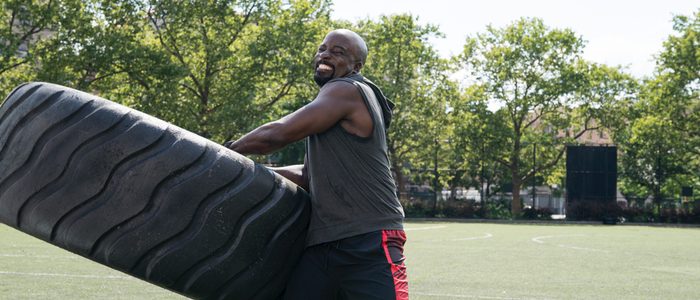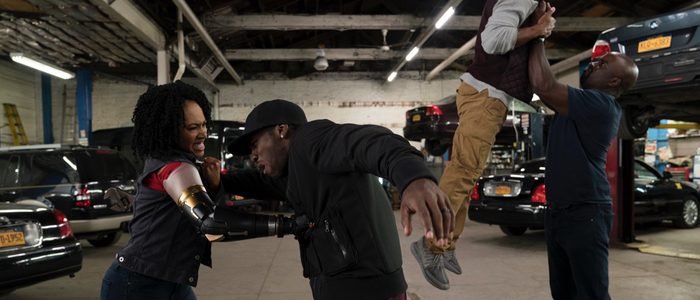'Luke Cage' Season 2 Review: Compelling Drama Gives Way To The Usual Netflix Pacing Problems
What It’s About
Luke Cage (Mike Colter), a very muscular man and former cop/ex-con, is a bulletproof, super-strong superhero from Harlem. Since the events of Luke Cage season 1 (and The Defenders), Luke has become a celebrity. The people in his neighborhood look up to him, major brands like Nike want to endorse him, and there's even a popular app that tracks his whereabouts. He goes about his day trying to do the right thing and enjoy life with his girlfriend, frequent Marvel Netflix crossover character Claire Temple (Rosario Dawson). But Luke's temper and anger begin to take a toll, driving a wedge between him and Claire. Further complicating matters is the re-emergence of Luke's estranged father (played by the late, great Reg E. Cathey in one of his final performances).Luke has done his best to keep Harlem safe, but all is not well. Corrupt club owner/gun runner/city council candidate Mariah Dillard (Alfre Woodard) lords over the neighborhood like a wicked queen, and the cops seem powerless to stop her. Still, Mariah is considering making changes, including possibly going legit. She's advised at every turn by her right-hand man/boyfriend Shades (Theo Rossi), and she's also trying to rekindle a damaged relationship with her estranged daughter Tilda (Gabrielle Dennis).Mariah is bad news, but there's a new threat in town: John 'Bushmaster' McIver (Mustafa Shakir), a deadly criminal who is somehow stronger than even Luke Cage. Bushmaster wants to take over Harlem, which means he'll have to take down Luke Cage. But his real target is Mariah, whom he has some serious personal beef with.In the midst of all this is Detective Misty Knight (Simone Missick), a cop and close friend of Luke's. Misty lost her arm in The Defenders, and her disability, coupled with the fact that her deceased partner Detective Rafael Scarfe (Frank Whaley) turned out to be massively corrupt, has made her a bit of a pariah on the force.All of these many plot threads congeal over 13 sluggish episodes, resulting in dramatic revelations, exciting action, killer music, and all-out war on the streets. And oh yeah, Danny Rand, AKA Iron Fist (Finn Jones), shows up at some point too.
What Works
In many ways, Luke Cage season 2 is a big step-up from season 1. Season 1 had many admirable moments, but the series felt top-heavy, with the bulk of the action loaded into the first few episodes. This gave the remaining episodes a stagnant, futile feeling that ended up dragging the whole endeavour down.Season 2 wisely spaces the action out (perhaps too much, but we'll get to that later). This is a packed season – there's enough stuff going on in season 2 to fill up two other shows. It's almost overwhelming at times, but it's impressive how creator Cheo Hodari Coker and company keep spinning so many different plates while keeping them up in the air.Mike Colter remains a charismatic lead, bringing physicality and charm to the role. Luke is a complex hero – he's not a tortured loner like Batman (or Daredevil), but he's also grappling with issues of anger. At the same time, he's an easy-going, likable guy that you want to spend time with. It's not an easy balance, but Colter pulls it off. Some of the best moments of season 2 involve the actor switching between dramatic angst and affable grace.On the other side of the coin, Alfre Woodard's Mariah Dillard is one of the most interesting villains in the Marvel Netflix universe. As we're reminded again and again this season, Mariah is pure evil. And yet Luke Cage season 2 takes the time to delve into her character, and her background. She's not a cackling one-note baddie, but a complicated, harrowing individual grappling with her own wild, unstable emotions. Woodard knows exactly how to play this part – a mix of over-the-top zeal and scary determination. She's so good that she's able to make screamed-out lines like "Bushmaster took all our money!!" sound convincing.Speaking of Bushmaster, Mustafa Shakir is a welcome addition to the cast. At first blush, Bushmaster seems a bit one-note – he's the scary, unstoppable bad guy come to ruin everyone's life. But as the series progresses, we learn more about his motivations. Shakir oozes a blend of attractiveness and menace; a drop of poison mingled with a drop of honey.I thought Theo Rossi's Shades was almost laughable simplistic in season 1 – he spent almost the entire season frowning and hiding behind his sunglasses. What a wonderful surprise it was to see his character fleshed out so considerably in season 2. Shades might be the most complicated character this season – he grapples with his love for Mariah, his violent outbursts, and his past. One plotline this season focuses on the storied history between Shades and friend/former cellmate Comanche (Thomas Q. Jones), and the way the show handles this relationship is remarkable. It goes down roads you won't expect, and the show is better for it.I wasn't particularly enamored with Misty Knight's storyline this season – she struggles to be a good cop, while also trying to shrug off the stink of being associated with a corrupt partner; she also gets a pretty cool robot arm. The narrative never exactly grabs you, but Simone Missick's performance – swagger swirling with rage – is robust enough to keep it interesting.Luke Cage season 2 succeeds when it's introducing new elements into the tired superhero genre. Luke's sudden fame is dealt with in ways I've never seen in a superhero movie or TV show. He's a minor-celebrity, and the public loves him...until they don't. All it takes is one knock-out from Bushmaster for Luke's adoring fans to suddenly turn on him. This rings true to life – fame is a more often a curse than a blessing, and today's superstar is tomorrow's tabloid headline. For reasons that can't adequately be explained beyond an inherent cruelty running through everyone's blood, fans sometimes seem to revel at the downfall of their idols – especially if said idols are related to "reality television." And that's essentially what Luke Cage is – he's a reality TV star; a personality; a presence. Luke struggles with this fame, and he also struggles with ways to pay the bills.Most superheroes are inherently wealthy, or we never hear about their financial issues at all. Super-strength aside, Luke is a normal, working-class guy who needs to make ends meet. In the comics, Luke became a hero for hire – someone who offered his super-services for pay. This may seem a bit mercenary, but it's also fascinating, and a topic other superhero properties don't dare touch. Luke Cage season 2 dabbles with it – although not overly so.In one episode, Luke, strapped for cash, agrees to be paid to appear at a mogul's party. He's told that all he needs to do is work the crowd and take a few selfies – but things turn dark, quick. Guests nonchalantly smash beer bottles over his head just to test how impervious to pain his is, and when Luke angrily reacts by grabbing the bottle smashing rich boy around the neck, the crowd reacts not in horror, but adulation – they circle the scene to take photos. Things only get worse when the party host opens up an auction in which the winner gets to shoot a gun at the bulletproof Luke. This is dark, different stuff – superhero properties don't dabble in this sort of thing, and to see it portrayed here is refreshing and absorbing.Nearly every episode this season is loaded with style and directorial flourishes. Most Marvel Netflix shows can be flat visually, but Luke Cage makes great use of shadows and filters. Scenes are bathed in neon reds, sickly oranges, emerald greens. Characters creep out of the shadows. On top of this, the fights – of which there are many – are pulse-pounding and exciting. We can practically feel each punch, each kick, each wall-shattering body-slam. Best of all, we can see it. Superhero films have descended into blurry, incoherent fight sequences created in computers. The fights in Luke Cage look and feel genuine; they're scrappy, and brutal, and on full display.All of these varied elements come together to create some authentically engrossing episodes of TV. And yet...
What Doesn’t Work
Shout it from the mother effing rooftops: there's no reason for these shows to be 13 episodes long. I've said it before, and I'll say it again. I will beat this goddamn drum until the drum head caves in and my knuckles are bloody. It's downright appalling that Netflix and Marvel keep pumping out these 13-episode seasons when they could tell a much better, and much more concise story in 6-to-8 episodes instead.Not a single Marvel/Netflix series has made a good use of the 13-episode run, and yet, Sweet Christmas, it keeps happening. There's a solid 8 hours of television buried under the 13-plus hours (some episodes are over an hour long) here.If Luke Cage season 2 made better use of pacing, and editing, the 13 episode length might not seem so bad. But the show's pacing is downright glacial at times. I'm all for a good slow-burn, but scene after scene of characters sitting in total silence in silent rooms starts to get friggin' ridiculous after a while.To be clear: I'm not saying the show needs to be wall-to-wall action to quicken the pace. I'm saying if you're going to have slow, quiet moments, you need to make them cinematic. TV, like film, is a visual medium. If you're not keeping your viewer visually engaged – even if the scene in question is a quiet conversation – you're wasting their time. A smart editor and filmmaker can make even the most dry, staid conversation pop off the screen.That's not the case here. So no matter how exciting certain moments of Luke Cage season 2 are, they're ultimately kneecapped by sluggish, lackluster pacing. The show draaaaags, and it shouldn't. Accompanying this issue is a bad case of repetitiveness. The writers are well-aware that they don't have enough story to fill out 13 episodes, so they deliberately repeat story beats and conversations again, and again. Characters will talk about something they just talked about a few scenes ago, and add nothing new to the conversation. It's aggravating.At the start of season 2, Rosario Dawson's Claire Temple is featured prominently. This is exciting for anyone who has watched all of these Marvel Netflix shows. Claire is the Marvel mainstay – she's appeared in every series except The Punisher. Dawson's take on the character is agreeable, but the shows have a bad habit of not giving her very much to do. Series after series, Claire is there simply to patch someone up, offer a quippy line or two, and then recede into the background. To see her start off here with such a major role was a breath of fresh air. But I should've known it couldn't last. Before Luke Cage season 2 even gets to its halfway point, it finds a way to essentially write Claire out of the show completely. It's a waste of Dawson's talents, and it could've been avoided – Luke shouldn't need a romantic separation to fuel his character motivations.This is going to sound like a strange complaint, but there's too much going on this season. In the section above I praised this season for keeping the action and drama going from episode to episode, but there comes a point where the storylines become almost too infinite to contain. This plotlines this season are so numerous that they don't just overflow, they cause a damn flood. There's so much going on that by the second-to-last episode, the show is still introducing us to new major characters. It's exhausting. It's also confusing – how can the show be so poor at pacing while also have so much going on? Luke Cage season 2 found a way.
Bottom Line: Should You Watch Luke Cage Season 2?
If you liked Luke Cage season 1, you're going to enjoy this new season. I had numerous issues with season 2 (see above!), but by the time the season ends, Luke Cage the show and Luke Cage the character are in a fascinating, interesting place. Just when I was ready to write-off future seasons of the show, the writers found a way to draw me back in. The Luke Cage we see at the end of season 2 is not the Luke Cage we meet at the beginning, and such a turn is going to leave you wanting more.If and when you do decide to partake in Luke Cage season 2, space it out. Don't binge. The show's plotting does not lend itself to binging, and the longer you take to burn through the season, the more rewarded you'll be.Luke Cage season 2 drops on Netflix on June 22, 2018.

